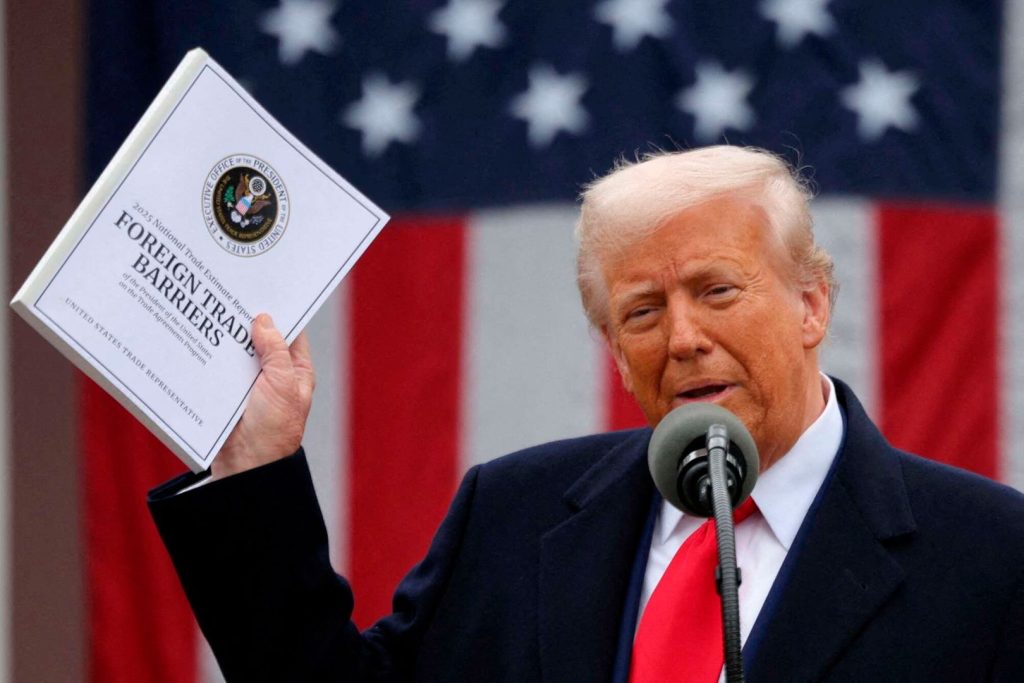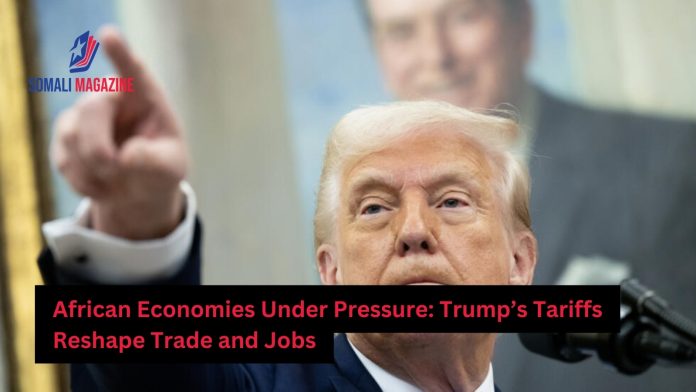Facebook Twitter Instagram Somali Magazine - People's Magazine
African economies are reeling from the impact of sweeping tariffs imposed by former U.S. President Donald Trump, as nations across the continent grapple with the fallout of protectionist trade policies. The tariffs, announced on April 2, 2025, include a baseline 10% duty on all imports to the United States, with additional levies targeting countries deemed “worst offenders” in global commerce. The move has disrupted trade flows, threatened jobs, and raised concerns about the future of U.S.-Africa economic relations.
Among the hardest-hit nations is Lesotho, which now faces a staggering 50% tariff on its textile exports to the U.S. The small southern African kingdom, where the textile industry accounts for 40% of local employment, risks losing tens of thousands of jobs as manufacturers struggle to remain competitive. Lesotho’s government has warned of severe economic consequences, including rising unemployment and potential political unrest.
South Africa, Africa’s second-largest economy, has also been dealt a significant blow, with a 30% tariff imposed on its exports of fresh produce and automobiles. The country’s automotive industry, which exports $2 billion worth of vehicles and parts to the U.S. annually under the African Growth and Opportunity Act (AGOA), is particularly vulnerable. Analysts predict that the tariffs will lead to job losses and reduced investment in the sector, further straining South Africa’s already fragile economy.
Other nations, including Nigeria, Kenya, and Madagascar, have been hit with tariffs ranging from 14% to 47%, affecting key industries such as agriculture, textiles, and minerals. The tariffs have disrupted supply chains and raised costs for African exporters, who now face significant barriers to accessing the U.S. market. For many countries, the new trade regime threatens to undermine decades of progress achieved under AGOA, which has provided duty-free access to the U.S. market for eligible African nations since 2000.
The tariffs have also cast doubt on the future of AGOA, which is set to expire in September 2025. Economists warn that the Trump administration’s protectionist policies make the renewal of the initiative unlikely, jeopardizing a program that has been credited with driving industrialization and job creation across the continent. African leaders have called for urgent negotiations to secure a new trade framework, emphasizing the importance of maintaining access to the U.S. market.

The impact of the tariffs extends beyond economic losses, as African nations face mounting pressure to diversify their trade relationships. Many countries are now exploring partnerships with China and other global powers to offset the decline in U.S. trade. Analysts note that the shift could reshape Africa’s economic landscape, with long-term implications for global trade dynamics.
Critics of Trump’s tariffs argue that the policies are counterproductive, harming both African economies and U.S. interests on the continent. Human rights organizations have expressed concern about the social consequences of the tariffs, warning that job losses and economic instability could exacerbate poverty and inequality in affected nations. The International Fresh Produce Association has also condemned the tariffs, highlighting their potential to disrupt global food security and inflate consumer prices.
As African nations navigate the challenges posed by Trump’s tariffs, the focus remains on finding solutions to mitigate the impact and foster resilience. Regional bodies like the African Union have called for greater collaboration and innovation to address the crisis, emphasizing the need for sustainable trade policies that benefit all parties.
The pain of Trump’s tariffs serves as a stark reminder of the complexities of global trade and the importance of equitable partnerships. For African economies, the road ahead will require strategic decision-making and collective action to overcome the barriers and build a more inclusive future.

